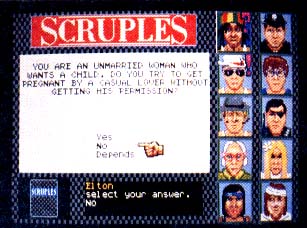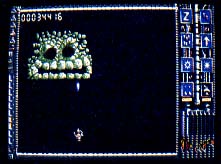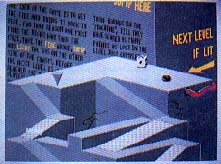For The Fun Of It
Of Scruples, Hostile Aliens and Whirling Dervishes
This issue we review a computer version of a popular board game, an arcade shoot-em-up written especially for xenophobes and a game that takes you on a dizzying journey with a whirling dervish.
A QUESTION OF SCRUPIES: THE COMPUTER EDITION
Reviewed by Gregg Pearlman
The Milton-Bradley board game "A Question of Scruples" can end friendships, ruin marriages and strain family relationships--it can be nastier and hurt more feelings than "The Newlywed Game" (No wonder it's so popular.) But that element isn't present in A Question of Scruples: The Computer Edition by Electronic Arts, because you can't hurt your ST's feelings.
In the computer version of Scruples, you adopt a persona and rate it from -8 to 8 in areas such as personal integrity, honesty, greed and shyness. You can play against as many as nine opponents, computer and human. And not only is each computer player unique but his or her personal characteristics differ from game to game--depending on their "moods." Characters range from policemen to punkers to nuns to just "average Joes."
 |
In A Question of Scruples: The Computer Edition, the computer players' faces change constantly-- and some of their expressions make them look downright deranged. |
The characteristics you've entered are displayed graphically as a histogram. At the end of the game, they're displayed again, along with an overlaying histogram of your "true" characteristics, as determined by your actual answers in the game. Sometimes the two histograms will be virtually identical; other times there will be great disparity. For instance, you might have told the computer at the start of the game that you're loaded with integrity, whereas your answers might show that you don't have an ounce. Other players' histograms are displayed before the game starts, but you only get a three-second glimpse of them, which gives you an (extremely limited) idea of the kinds of people you're dealing with. Based on a computer player's appearance, the game decides just how much merit he or she has as a person and determines characteristics accordingly.
A side note: Interestingly enough, a complete louse has a fairly good chance of winning--a character I called "Mutant" rated extremely low in all favorable qualities, such as personal integrity, and extremely high in unfavorable ones, such as greed; he won consistently.
Playing the Game
In both the board game and the computer game each player receives a certain number of dilemma cards and one answer card. The dilemma cards pose moral questions along the lines of, "You try to phone a friend at 1 a.m. and dial another fnend by mistake. Do you identify yourself?" or "You've driven into a parked car; do you leave a note?" Your answer card will say YES, NO or DEPENDS. If, for instance, your answer card says YES, your job is to detemmine which of your opponents will give a "yes" answer to one of your questions. If you're right, you take a new answer card. If you're wrong, you take an answer card and a new dilemma card. The object is to get rid of all your dilemma cards.
It's not enough to give a yes, no or depends answer: you must justify it. If one of your opponents thinks you're full of hooey, he or she can challenge you by saying what they think your answer really is. Then all players vote on which of you they believe. The loser must take a dilemma card from the winner.
Many of the questions are fairly harmless (Would you give up your seat on the bus to an elderly person? If your neighbors' dog ate some rat poison in your backyard, would you tell them?), while others can make or break a relationship (If you had an out-of-town extramarital fling, would you tell your spouse? You find your spouse's personal address book; do you glance through it?).
Actual gameplay is fairly simple. Scruples requires a mouse. Click on your answer card to find out what it says, then click on the question you want to ask an opponent. Next, click on the character that you want to answer the question. If you don't believe his or her answer, click on YES to challenge it. Otherwise click on NO. Simple enough.
The Fun Stuff
Computer Scruples can be a very funny game and among its most humorous elements is the variety of facial expressions your opponents display. As the game progresses, these players alternately smile, frown, wink, look around, yawn, or gape in surprise. One of the most common sequences shows a mouth saying "Ah. Ooh. Oh." The scruffier the character, the more manic he or she tends to look.
This game was programmed by Leisure Genius of London and a certain British flavor of the game comes through. For instance the policeman wears a constable's bell helmet. Also, British expressions show up, such as "fancy," as in "I fancy a nice piece of fish," and "our" words, such as flavour, colour, favour, etc.
The documentation tells you all you need to know. In fact, since I already knew how to play the board game, I hardly needed to use the computer docs. The booklet is only 16 pages, but it's full of illustrations and it's mapped out clearly.
Problems
Computer Scruples is not without its quirks. It takes an annoying amount of time between stages of a turn. It also tends to use some questions more than once during the same game, especially if there are no human players. And after you choose players, the game won't let you "unchoose" any unwanted character. Nor will it let you play more than two games with the same group of computer players. (This is probably a bug in the game; there's no alert box that pops up and says "You can't play anymore with these characters.") Finally, there's no option to quit the game entirely--you must shut off your system and reboot.
A Scrupulous Recommendation
A Question of Scruples: The Computer Edition is a good game that can become nasty at times. It is, I'm sorry to say, kind of a dumb implementation of the board version--but probably the only one possible. I think it's fair to conclude that A Question of Scruples simply doesn't lend itself to a computer atmosphere. Human personalities are complex and not easily quantified, so it's hard to believe in these fictitious computer characters.
On the other hand, Computer Scruples is still a fun game at least for a while. When I played with three other people here at START, they seemed to find it intriguing but after the second or third round of questions, they'd seen enough.
A Question of Scruples: The Computer Edition isn't the party game it would like to be. It's a decent one-player game and creating the characters is fun--it's a blast to watch their unusual facial expressions. But given the choice between this version and the board game, I'd have go with the board game.
BETTER DEAD THAN ALIEN
Reviewed by Scot Tumlin
Remember the first really good coin-operated video games like Asteroids, Space Invaders and Galaxian? Do you ever miss them? If so, pick up a copy of Better Dead Than Alien, the first ST release from Discovery Software. All three games have been combined in one often humorous package complete with digitized sounds of applause--or derisive laughter.
As Brad Zoom, alien-blaster extraordinaire, your goal is to destroy wave after wave of continuously advancing alien invaders until either they're all gone or you're all dead! With stunning graphics, Better Dead Than Alien (BDTA) will take you back to the days when alien-bashing and asteroid-smashing were all the rage.
Unavoidable Comparisons
The first few waves of BDTA start much the same way Space Invaders did: column after column of aliens move across the screen, while inching closer and closer to where you are at the bottom of the screen. But unlike the Atari arcade classic, BDTA allows your mouse-controlled spacecraft more freedom of movement, so you can move it up and down as well as sideways.
Like Galaxian, BDTA has aliens that make random strafing runs toward you and your ship. Each wave is composed of a different alien lifeform. As the waves progress they become more difficult. One wave displays a huge alien advancing on your ship. It takes a lot of shots to bring this puppy down.
Every other wave or so, a screen appears that will remind you of the famous arcade game Asteroids. Huge space boulders careen back and forth across the screen and you must skillfully dodge and blast them before they smash your ship. Once hit, an asteroid will break up into smaller asteroids, making survival even more difficult. I found that the best strategy is to destroy one asteroid at a time.
 |
In Better Dead Than Alien, Space In- vaders, Galaxians and Asteroids are combined into one sophisticated game--which has a lot more humor than you'd expect in a space shoot-em-up. |
The number of waves in BDTA is a secret the game's programmers would rather keep to themselves. I still don't know how many there are but I suspect it's well into the double digits. Waves are often given bizarre names, like Soprano or Jabberwocky. It's up to you to find them all.
The Energy Cylinders
All the aliens have red eyes. During each wave a bell will sound at random intervals and one of the aliens' eyes will turn green. If you shoot that particular alien and catch the cylinder it drops, you gain more power for your ship. A gauge on the lower right of the screen monitors your fuel consumption.
Often, energy is not the only reward for catching the cylinders. To the right of the game screen are icons that represent various weapons; one of these gives your ship rapid-fire capability, while another lets you fire single laser bolts powerful enough to destroy an entire column of aliens. Whichever icon is flashing when you catch the energy cylinder indicates which weapon you receive.
Manual and Wrap-up
The documentation for Better Dead Than Alien is scant at best. Fortunately, once you boot the game you'll have little problem figuring out what to do. The software package also includes a Brad Zoom comic book adventure.
BDTA is easy to learn and fun to play. If you want to bring the good old days of the arcade to your Atari ST, pick up a copy of Better Dead Than Alien. And remember, the only good alien is a dead alien!
DIZZY WIZARD
Reviewed by David Plotkin
Dizzy Wizard is a game that has you guiding a whirling dervish through narrow paths, over obstacles and across gaping chasms. Developed for at least one megabyte of RAM and requiring a color monitor, Dizzy Wizard has a superior control system that demands quick reflexes and well-honed skill. But its also terribly flawed (as many European imports are) by poor instructions and frustrating scenarios.
Controlling the Dervish
The object of Dizzy Wizard is to maneuver the dervish (a spirit) from a high plateau to the bottom of the level, where he can find and seize a fire. Afterwards, you must guide him back to where he started. Each level consists of hills, pathways, bridges, elevators and conveyor belts--and plenty of obstacles. You can use either the joystick, mouse or keyboard to guide the dervish. Go with the mouse.
The control system is outstanding: in fact, it's everything Marble Madness for the ST should have been. The control system is very intuitive and responds exactly the way you'd expect. The dervish keeps up with your mouse movements, in terms of both speed and direction.
The Obstacles
As you negotiate the dervish down the levels and back up again, you'll encounter a variety of items, some helpful, some harmful. Dice will appear from time to time and running over them earns points. And accumulating points is important, because there's a minimum score you must attain before you can move to the next level, even if you return the fire to the top. If you don't meet the minimum score you'll have to do the whole level over again.
Each level has a time limit and if you don't complete the level within that limit, the game ends. You can have up to three dervishes going at once with the computer controlling any one of them. But watch out: the other dervishes can get in your way too.
Great Graphics, But. . .
The graphics and sound in Dizzy Wizard are excellent and, as I've said, the control system is wonderful. Unfortunately, all this is wasted on a game that is excessively frustrating in many ways.
The frustrations begin with the loading process. Dizzy Wizard is heavily copy-protected, not only on the disk but also on a card with a grid of letters and numbers on it. The program will ask you for the symbol at the intersection of a particular row and column. Not only had you better take care not to lose the card, but you must have a ruler handy to figure out which symbol to enter. Be careful, because the instructions are confusing as to which symbol to key in.
The documentation is very brief. I've found that games from Europe seem to have been designed by people who feel that the way to increase the time spent on a game is to make the game very difficult and tell you little or nothing about how to play it. Thus, you have to experiment and get killed off many, many times before you figure out how to get past even one obstacle.
 |
Will Dizzy Wizard's outstanding graphics, sound and control system make up for its obysmal documentation? You make the call. |
For example, when you pick up the fire and start back up to the top of a level, the fire will suddenly detach itself from the dervish for no apparent reason and just sit there. It turns out that you can't pick it up again until you find more dice and accumulate more points. Clearly something like this needs to be documented, but you're left on your own to find it out.
More Frustrations
While you're moving on to the next level a screen of blocks will appear suddenly and nothing you do can remove it. Then it'll disappear just as suddenly as it appeared. Since there's a picture of this screen on the game package, I must conclude that it's not a computer glitch. However, I still haven't figured out what it means or why it appears.
The supreme frustration in Dizzy Wizard comes when you return to the top of the level with the fire. Swelling with pride, you're ready to move on to the next level--but just how do you do that? The documentation doesn't tell you, so you're left to wander around until time runs out. This is totally unacceptable. Having played hundreds of computer games, I've rarely come across documentation as inadequate as Dizzy Wizard's.
Nevertheless. . .
Once you get past the problems, Dizzy Wizard is a pretty good game overall. But youll need the patience of Buddha to tackle a game with documentation this inadequate. In other words, Dizzy Wizard is not for someone who isn't very tolerant. With excellent graphics and sound and a superb control system, this game is probably fun to play--if you can figure out how to play it.
Gregg Pearlman is an Assistant Editor for START. Scot Tumlin is Direct Mail Sales and Support Supervisor for Antic Software. David Plotkin is a chemical engineer for Chevron U.S.A. and a Contributing Editor for START.
PRODUCTS MENTIONED
A Question of Scruples: The Computer Edition, $39.95. Electronic Arts, 1820 Gateway Drive, San Mateo, CA 94404, (415) 571-7171.
Better Dead Than Alien, $34.95. Electra Software, Imported by Discovery Software International, 163 Conduit Street, Annapolis, MD 21401, (301) 268-9877.
Dizzy Wizard, $24.95. Diamond Games, distributed by Robtek, Ltd., 1983 San Luis Ave., Suite 24, Mountain View, CA 94043, (415) 968-1345.